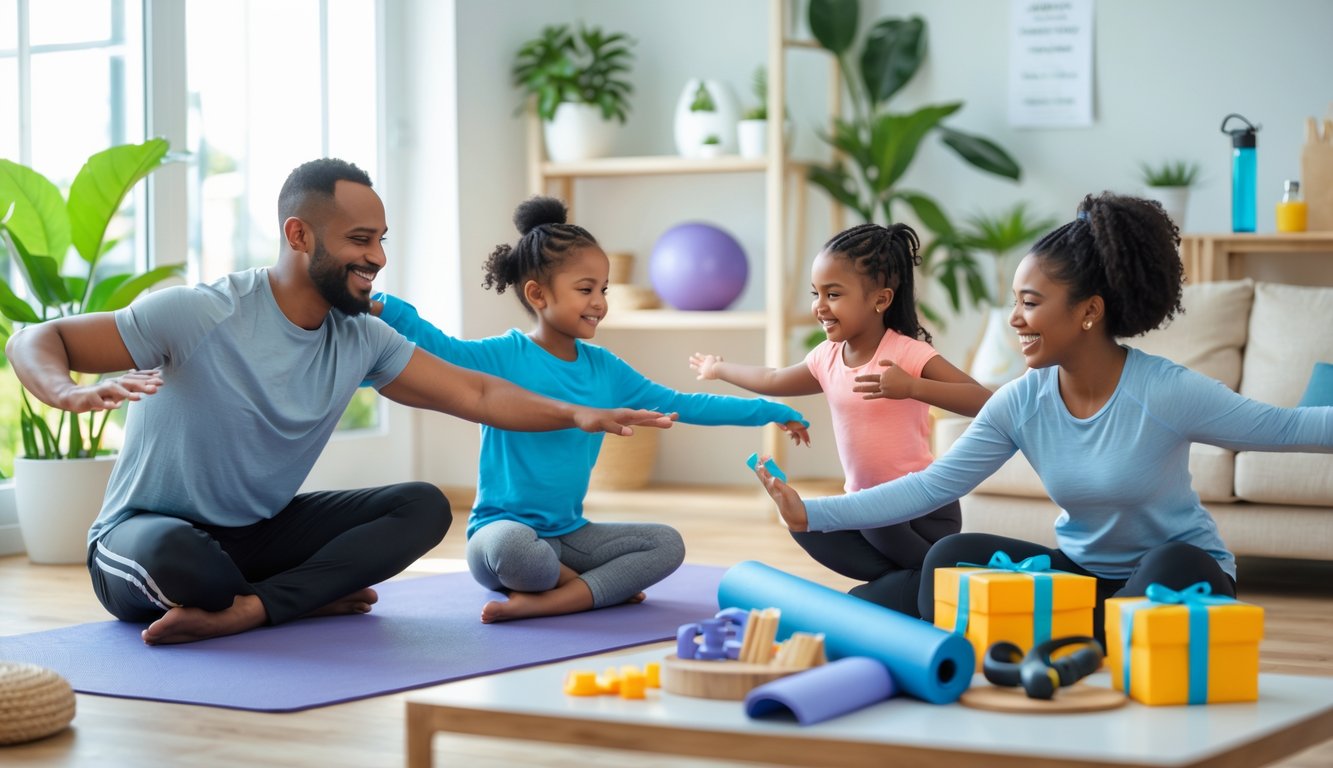
Relaxation Tools for Recovery
Essential oils, weighted blankets, foam rollers—my cousin swears by them after knee surgery. Are baths “recovery” or just hot water? My sports doc says daily stretching helps, but I forget until Netflix asks “Are you still watching?” Bought a lavender spray once; made my pillow smell like soap and old socks, not exactly zen.
Infrared lamps, foot massagers, those silk sleep masks pro athletes supposedly use—you’ve seen half this stuff in “recovery” spa baskets online. An occupational therapist told me, “If relaxation tools stress you out, they’re pointless.” Recovery guns and compression boots look scientific, so I bought a mini one that overheats in five minutes.
Honestly, sleep and recovery gifts only do anything if they actually fit your family’s vibe, not just what looks cool on Instagram. You can buy a $2,000 sleep pod, but if your dog howls at 2 a.m., you’re still awake.
Family-Friendly Fitness and Movement Gifts

Trying to get everyone moving at home is mostly a mess—awkward, occasionally hilarious, and honestly, way more successful if there’s something new or weird involved. Best gifts? Not giant home gyms. It’s the small, no-drama tech and silly challenges that fit into whatever chaos’s already happening.
Fitness Trackers for All Ages
My niece’s Fitbit started a minor family civil war—six people, three dogs, two dishwasher dunks later, nobody admits to cheating the step count. Johns Hopkins says wearables boost daily steps by 800 more than non-users, which is wild considering I won’t even walk to the mailbox if it’s raining.
Nobody cares about the plastic band until the battery’s dead; then it’s all lost chargers and fights about “real” exercise versus “pacing the kitchen.” I ignore the calorie counts, but heart rate tracking actually snapped my brother out of denial about his sleep. Pediatricians keep repeating, “Screens aren’t the issue, inactivity is,” so even the under-10s get in on it.
Garmin, Fitbit, Apple Watch—they all have “kid” settings now, so there’s something for actual children, moody teenagers, tech-ambivalent adults, and cranky grandparents who call it “watching my pulse on TV.” No, shaking your arm doesn’t work. I’ve tried.
Walking and Step Challenges for Health
Step challenges: motivating or just annoying? Nobody remembers who started the “family 10K month,” but now the fridge is plastered with progress charts. University of Michigan says walking 7,000 steps a day can cut early death risk by up to 70%. Feels dramatic, but I’ll take any excuse to skip the elevator.
I started my own challenge by accident—the dog needed more walks, then Mom’s knee got better, so now we’re logging steps and discovering all the sidewalk cracks in the neighborhood. Digital leaderboards spark secret competition (my sister’s 1 a.m. laps aren’t fooling anyone). Prizes? Barely exist: a nice water bottle, maybe a shared pizza, and that “wellbeing” feeling a Mayo Clinic doc called “the most underrated gift.”
Everyone finds their own weird rhythm. My friend only counts “purposeful” steps (whatever that means), my cousin logs hers while pacing on phone calls. It’s less about rules, more about not sitting still—and, yeah, sometimes arguing about what counts.
Mindfulness and Meditation: Cultivating Mental Well-Being

One minute my phone pings and suddenly I’m thinking about blood pressure again—wait, is anxiety just modern life with a new label? Tried “family quiet time” last week. Chaos only dipped after the second round of breathing apps and, let’s be real, a little bribery. Mindfulness, meditation, whatever you call it—there’s solid science behind it, and even the Mayo Clinic says it helps with stress and mood, but nobody mentions the disaster when a toddler hijacks your guided relaxation.
Meditation Tools for Beginners and Families
Trying to pick meditation tools is… honestly, kind of a joke. You search once and suddenly there are “starter kits” everywhere—gratitude journals, bowls that look like props from a crystal shop, all these apps with voices that sound like they’re auditioning for a children’s TV show. I just grabbed Headspace because my sister’s therapist said it worked for new parents. Did it? Maybe. Calm has these sleep stories for kids (there’s a llama one, and I’m not proud to admit it, but it beat my bedtime routine by a mile). NIH claims even the basic guided audio stuff can lower blood pressure. I read this 2022 trial—people’s anxiety scores dropped by 21% after six weeks, or so they said. Seems weirdly specific.
Those meditation cards and coloring books for kids? Way more useful than those “mindfulness stones” that end up under the radiator. Every kid under eight will fight you for the squishy meditation bell, though. Pediatricians keep pushing “family mindfulness sessions” now, but nobody warns you that the whole thing falls apart when the dog starts snoring and everyone cracks up during the “body scan.” Not exactly zen.
Incorporating Mindfulness into Daily Life
I can’t figure out how people “remember to be mindful” all day. I’ve ignored every habit tracker app, but somehow my smartwatch’s 2 p.m. breathing reminder actually works. Started setting up “mini mindfulness zones” in the dumbest places—kitchen window (waiting for the kettle), carpool lane, dentist office, folding laundry (not zen, not ever, stop lying Instagram). Dr. Sarah Allen, Ph.D., told me it’s fine to be distracted; apparently, even brief, half-hearted practice triggers those “calming neural pathways.” Whatever those are.
I gave up on the classic 20-minute session. Now it’s two minutes, five times a day. Only the first one feels remotely peaceful. The rest? Just more interruptions. But, I don’t know, maybe it adds up. Mayo Clinic says even these tiny, unglamorous moments help with anxiety. I guess they’ve never had their kitchen timer go off mid-breath; that’s the opposite of calm.
Managing Anxiety Through Guided Practices
Nobody told me meditation could make anxiety worse. Tried some advanced guided thing last month and lost it when the instructor said, “Notice every sensation.” All of them? My foot cramped, and then I just spiraled about my circulation. For anxiety, I stick to audio tracks from actual therapists—NCCIH says go for evidence-based stuff, not YouTube “relaxation gurus.”
Box breathing (inhale, hold, exhale, hold, four seconds each) is the only thing that calms me down fast. Mayo Clinic says guided body scans help for pain and stress, but if I skip headphones and try to meditate around my family? Forget it. Expecting “instant calm” is a joke, but after a few weeks, I do sleep better and don’t spiral at 2 a.m. as much. Nobody ever tells you how often you’ll forget which app you last opened, though.